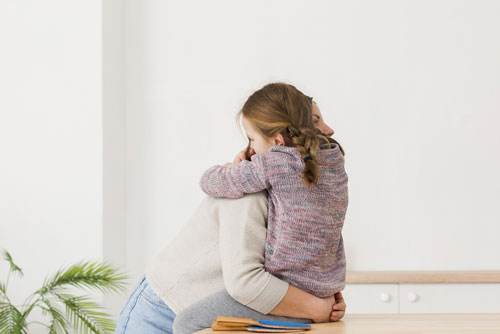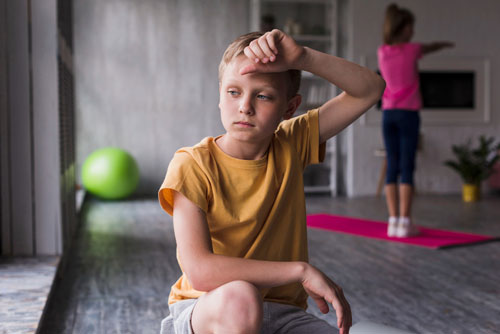Mental health issues have become a significant concern in today’s society, and the impact of depression on children is particularly worrisome. While traditional treatments like therapy and medication remain vital, recent research has highlighted the critical role of exercise in managing depression symptoms among children.
In this article, we will delve into the importance of physical activity in supporting the mental well-being of children battling depression.

Understanding Childhood Depression
Childhood depression is a serious mental health issue that can significantly impact a child’s emotional well-being, social development, and academic performance.
Despite common misconceptions, depression is not merely a temporary feeling of sadness but a complex and persistent mood disorder that requires careful attention and understanding.
Defining Childhood Depression
Children experiencing depression often display symptoms different from those observed in adults. While the core symptoms may overlap, signs of depression in children can manifest in various ways, including irritability, social withdrawal, changes in appetite, and disrupted sleep patterns.
Parents, caregivers, and educators must be able to recognize these signs early on to provide timely support and intervention.
Prevalence and Risk Factors
According to the World Health Organization (WHO), depression affects approximately 3% of children aged 6-12 and 6% of adolescents aged 12-14. These numbers, however, may be underestimated due to the challenge of identifying depression in young children.
Various risk factors contribute to the development of childhood depression, including genetic predisposition, traumatic experiences, family history of mental illness, and stressful life events such as loss, parental conflicts, or academic pressure.
Impact on Development
Childhood depression can significantly disrupt a child’s normal developmental trajectory. It can impede social skills development, hinder academic performance, and lead to long-term emotional and behavioral difficulties.
Depressed children may experience challenges in forming healthy relationships, which can affect their self-esteem and confidence. Furthermore, the impact of depression on cognitive development and academic achievement is a growing concern for parents and educators alike.
Early Intervention and Support
Recognizing the signs of childhood depression and providing early intervention and support is crucial. Creating a safe and nurturing environment where children feel comfortable expressing their emotions is vital in addressing this mental health issue.
Engaging with mental health professionals, such as therapists or child psychologists, can aid in the assessment and development of appropriate treatment plans tailored to the child’s specific needs.
By understanding the unique nature of childhood depression, we can work towards creating a more empathetic and supportive environment for children facing mental health challenges.
It is imperative to foster open communication and provide a safe space for children to express their feelings without judgment or stigma.

The Impact of Exercise on Mental Health
In recent years, the relationship between physical activity and mental health has garnered significant attention from researchers and health professionals. This is especially pertinent in the context of childhood depression, where exercise has shown remarkable potential in improving overall well-being and managing depressive symptoms.
Understanding the profound impact of exercise on mental health can pave the way for more holistic and integrated approaches to addressing mental health issues in children.
The link between Physical Activity and Mental Well-being
Research suggests that regular exercise can contribute to improved mental health by stimulating various brain chemicals that foster feelings of happiness and relaxation. Physical activity promotes the release of endorphins, which act as natural mood lifters and reduce the production of stress hormones such as cortisol.
These physiological changes can help alleviate symptoms of depression and anxiety, promoting a more positive outlook and enhancing emotional resilience in children.
Psychological Benefits of Exercise
Beyond the biological effects, engaging in physical activity offers a range of psychological benefits for children struggling with depression. Exercise can serve as a constructive outlet for emotional expression and stress reduction, allowing children to channel their negative emotions into a positive and productive activity.
Additionally, participating in group exercises or team sports fosters a sense of belonging and social connection, which is vital for combating feelings of isolation and loneliness often associated with depression.
Enhanced Cognitive Function
Regular physical activity has also been linked to improved cognitive function and enhanced concentration, which can have a positive impact on academic performance and overall cognitive development. Exercise promotes better sleep patterns, which are crucial for cognitive consolidation and emotional regulation in children.
By enhancing cognitive function, exercise contributes to the overall improvement of mental well-being and can help children better cope with the challenges associated with depression.
Holistic Approach to Treatment
Recognizing the multifaceted benefits of exercise on mental health, health professionals are increasingly incorporating physical activity as a complementary component in the treatment of childhood depression.
Integrating exercise into therapy sessions or recommending structured physical activities tailored to the child’s interests not only aids in symptom management but also empowers children to take an active role in their mental health journey. This holistic approach recognizes the interconnectedness of physical and mental well-being and encourages a more comprehensive and sustainable path to recovery.
Understanding the profound impact of exercise on mental health underscores the importance of promoting an active lifestyle among children as a preventive measure against mental health challenges. By prioritizing physical activity as an integral part of a child’s routine, we can foster resilience, emotional well-being, and overall healthy development.
Incorporating Physical Activity into Treatment Plans
As the understanding of the therapeutic benefits of exercise continues to evolve, professionals in the field of mental health are increasingly incorporating physical activity into comprehensive treatment plans for children with depression. By integrating exercise into therapy sessions, professionals aim to provide a holistic approach that addresses both the physical and psychological aspects of the child’s well-being.
Discuss how professionals integrate exercise into therapy for children with depression
Therapists and mental health professionals employ various strategies to integrate exercise into therapy for children with depression seamlessly. One common approach involves incorporating physical activities within the framework of cognitive-behavioral therapy (CBT).
By combining talk therapy with physical movement, therapists can facilitate emotional expression, promote self-awareness, and instill healthy coping mechanisms in children. This integrative method encourages children to connect their emotions with physical sensations, fostering a deeper understanding of their emotional experiences.
Furthermore, some therapists utilize play therapy techniques that incorporate structured physical activities to encourage emotional regulation and expression. By engaging children in playful exercises, therapists create a safe and enjoyable environment where children can explore their feelings and experiences in a non-threatening and non-judgmental way.
This approach not only facilitates emotional processing but also encourages the development of positive associations with physical activity, promoting a sustainable habit of exercise for improved mental well-being.
Explore the various types of physical activities that can be beneficial for children’s mental health
When considering the incorporation of physical activity into treatment plans for children with depression, it is essential to explore a diverse range of activities that cater to the individual preferences and needs of each child.
Some beneficial activities include structured exercises such as yoga, which promote mindfulness and relaxation, fostering a sense of inner calm and emotional balance. Additionally, aerobic exercises like running, swimming, or cycling can stimulate the release of endorphins, contributing to improved mood and overall well-being.
Team sports and group activities also offer valuable opportunities for children to build social connections, enhance teamwork skills, and develop a sense of camaraderie, all of which are essential for fostering a positive self-image and combating feelings of isolation.
Creative activities such as dance, art therapy, or nature-based exercises can provide alternative outlets for emotional expression and promote self-discovery, encouraging children to explore their emotions creatively and expressively.
By exploring a diverse range of physical activities tailored to the unique needs of each child, professionals can effectively incorporate exercise into treatment plans, fostering a holistic and personalized approach to supporting children’s mental health and well-being.
Nurturing Healthy Habits and Long-Term Well-being
In the context of managing childhood depression, nurturing healthy habits and fostering long-term well-being are crucial for promoting resilience and preventing the recurrence of depressive symptoms.
Cultivating a positive and sustainable relationship with exercise from a young age can significantly contribute to a child’s overall emotional and physical development, laying the foundation for a lifetime of well-being and mental resilience.
Emphasize the importance of cultivating a positive relationship with exercise from a young age
Instilling a positive relationship with exercise from a young age not only promotes physical health but also fosters essential life skills such as discipline, self-motivation, and goal-setting. By encouraging children to view physical activity as a source of joy and self-expression rather than an obligation, caregivers and educators can help children develop a healthy attitude towards exercise, promoting a sense of empowerment and self-efficacy.
This positive association with physical activity can serve as a valuable coping mechanism during challenging times and contribute to the development of a resilient mindset, which is instrumental in managing mental health challenges like depression.
Provide tips for parents and guardians on how to encourage regular physical activity in their children’s daily routines
Encouraging regular physical activity in children’s daily routines is instrumental in promoting their overall well-being and mental health. To facilitate this, parents and guardians can adopt various strategies tailored to their children’s interests and preferences.
Setting a positive example by engaging in physical activities as a family not only fosters a sense of togetherness but also encourages children to view exercise as a fun and integral part of daily life.
Additionally, incorporating physical activities into children’s daily schedules, such as allocating time for outdoor play, enrolling them in sports programs, or encouraging recreational activities, can help establish a consistent exercise routine.
Providing a supportive and encouraging environment that celebrates children’s efforts and accomplishments in physical activities can further reinforce their positive attitude toward exercise.
Moreover, offering a diverse range of physical activities that cater to children’s interests can help them discover enjoyable and sustainable ways to stay physically active, promoting a lifelong habit of exercise and contributing to their long-term well-being.
By nurturing healthy habits and fostering a positive relationship with exercise from a young age, parents and guardians play a pivotal role in promoting their children’s overall well-being and resilience, laying the groundwork for a healthy and fulfilling life.
Conclusion
Recognizing the significance of exercise in managing depression symptoms in children is crucial. By understanding the positive impact of physical activity on mental well-being, we can foster a more holistic approach to the treatment and prevention of childhood depression.
We encourage you to share your thoughts and experiences on this topic in the comments below.







